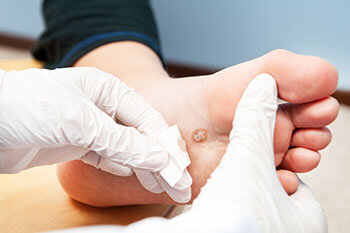Plantar Warts
Plantar Warts Treatment in Detroit, Sterling Heights, Hamtramck, Dearborn Heights, Madison Heights, Redford & Livonia, MI
 Plantar warts develop on the plantar areas of the feet, namely the soles or the bottom of the feet that bear weight. Sometimes plantar warts can grow in a cluster, which is referred to as mosaic warts. Though they are generally harmless, plantar warts can be very painful and can require professional help.
Plantar warts develop on the plantar areas of the feet, namely the soles or the bottom of the feet that bear weight. Sometimes plantar warts can grow in a cluster, which is referred to as mosaic warts. Though they are generally harmless, plantar warts can be very painful and can require professional help.
Causes of Plantar Warts
Plantar warts can develop when a virus enters through the skin, often by a cut or scrape. They’re contagious and typically spread in locations such as public swimming pools, communal showers, as well as your shower at home. Gym facilities and yoga studios may also be more susceptible to plantar wart breakouts due to their publicly shared spaces. Plantar warts are commonly found among children and those with weaker immune systems.
To tell if you have plantar warts, you should check the soles of your feet for bumpy growths. Sometimes these growths may come with a tiny black dot in the center. You may also have plantar warts if you experience pain when walking or standing up. Because plantar warts are easily confused with other foot conditions like corns or calluses, it’s important you seek professional help for proper treatment.
If you suspect you have plantar warts, you may have the following symptoms: pain or tenderness while walking, a lesion that interrupts the ridges in the skin of your foot, small fleshy lesions on the bottom of the foot, or a callus where a wart has grown inward over a well-defined spot on the skin.
Since plantar warts are caused by HPV, or human papillomavirus, and is very contagious, it’s important that you take certain measures to help avoid getting this condition. To start, you can do this by washing your hands frequently and drying them completely, since warts thrive with moisture. You should also wear shoes in public spaces like swimming pools and locker rooms. It’s important to avoid touching someone else’s wart or picking at your own warts as well. Along with not picking at your warts, it’s imperative that you refrain from shaving, brushing, or clipping areas that have warts.
If you’d like more information about plantar warts and how they’re treated, we recommend you speak with a podiatrist for professional guidance and care.




